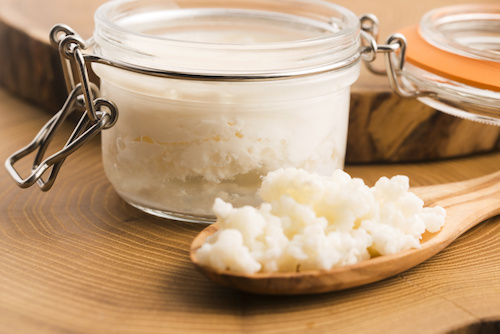One of the hottest health food trends right now is probiotics. Phrases like “good bacteria” are popping up everywhere, from commercials to articles to product packaging. They promise to do everything from boosting the immune system to alleviating constipation to regulating irritable bowel syndrome.
Probiotics are bacteria that occur naturally in some cultured or fermented food, such as yogurt, kefir and kimchee. They’re called “good” bacteria because they mimic or resemble the beneficial bacteria already present in our digestive tracts. With an ever-expanding line of products touting probiotic benefits, however, how can we know how potent and safe probiotics in foods and supplements really are, if at all?
Before you run out and purchase specially marketed products boasting the best probiotic content, here are three things to consider:
# 1: Probiotics, like all dietary supplements, do not require FDA approval.
While there is scientific evidence of the role gut bacteria plays in overall health, and the ways in which certain probiotics may contribute to that, there may not yet be enough proof to indicate that adding supplemental probiotics can enhance these benefits in all the ways products claim. While these structure-function claims are legally acceptable, probiotics cannot be marketed as a treatment for a disease without more rigorous testing. According to the National Institutes of Health, “The U.S. Food and Drug Administration (FDA) has not approved any probiotics for preventing or treating any health problem.”
Though most medical professionals consider probiotic supplements to be relatively safe for adults, manufacturers are not required to warn consumers that their products could be dangerous for people with certain conditions.
Less stringent monitoring by the FDA also means manufacturers are allowed to label their products as containing probiotics without establishing a minimum amount of the bacteria. Consumers could be purchasing products looking for the benefits of probiotics only to waste their money. This isn’t to say probiotic supplements and foods where the bacteria occur naturally are ineffective or dangerous. They just require careful label-reading and outside research before purchasing – something the average consumer doesn’t always have the time or means to do.
#2: Not all probiotics are created equal.
Though companies are adding cultures to virtually everything right now, the best probiotics are the types that occur naturally in foods. They are most easily accessible in dairy foods such as yogurt, kefir and aged cheeses, but many fermented foods like kimchee, sauerkraut and miso also contain high levels of probiotic bacteria.

Because probiotic cultures can be rendered ineffective relatively easily, probiotic-rich foods should be purchased as fresh as possible. Avoid products that have been exposed to high heat or frozen for long periods of time.
Check your local farmers market for dairies and fermenters to ensure you’re buying the most effective products available. The Chapel Hill Farmers Market or the Raleigh Farmers Market/State Farmers Market are some of the wonderful resources in our area to find the freshest probiotic-rich foods.
Beyond the freshness of the product, not all cultures are shown to be effective for the same conditions. Certain strains of bacteria are more beneficial for different goals, and some may be entirely ineffective for particular conditions. For each of these common uses of probiotics, look for the following ingredients in supplements and food products to determine the best probiotic strain for you:
Immune system support:
- Bifidobacterium longum
- Bacillus coagulans
- Lactobacillus reuteri
Alleviation of diarrhea:
- Bifidobacterium breve
- thermophilus
- Lactobacillus rhamnosus GG
Alleviation of skin allergies or inflammation, including symptoms of irritable bowel syndrome:
- Bifidobacterium lactis
- Lactobacillus casei
- Bifidobacterium infantis
#3: Not everyone should be taking probiotics.
Though experts agree that probiotics are almost universally safe for healthy adults and children, some people should avoid them or take them only sparingly. It’s always important to review the use of any supplement with your doctor, and probiotics are no exception. If you fall into any of these categories or have any of these conditions, consult your doctor before adding probiotics to your diet:
- You are pregnant or breast-feeding. In this case, some strains may be safe and others may be contraindicated.
- You have a serious health condition, including terminal cancer, and/or are otherwise severely immunocompromised.
- You have recently had surgery
- You are taking antibiotics, antimicrobials, or antibacterials. Your doctor may advise you on the best time of day to take probiotics or the best probiotic strain to seek out while you’re taking these medications.
If you are a parent of an infant, always consult your child’s pediatrician before administering any dietary supplements.
While probiotics can be a wonderful support in alleviating minor symptoms or boosting the immune system of healthy individuals, adding them to your diet should be done with awareness and after research. This will ensure you’re taking in the most effective, healthiest strains for your body’s needs. Your health – and your wallet – will thank you.
Sources:
https://nccih.nih.gov/health/probiotics/introduction.htm#effects


